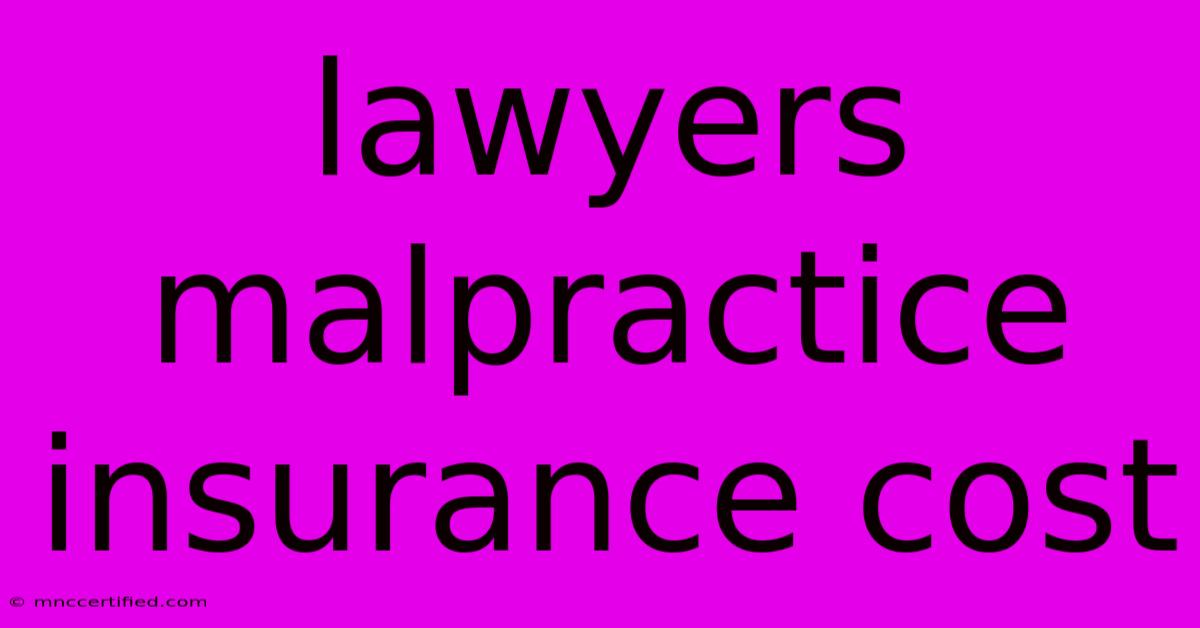Lawyers Malpractice Insurance Cost

Table of Contents
Lawyers Malpractice Insurance Cost: A Comprehensive Guide
Choosing the right malpractice insurance is crucial for any lawyer. Protecting your career and financial stability requires understanding the factors influencing the cost of this critical coverage. This comprehensive guide explores the key elements determining your lawyers malpractice insurance cost, helping you make informed decisions.
Understanding Lawyers Malpractice Insurance
Before diving into cost, let's clarify what lawyers malpractice insurance covers. This insurance protects you against financial losses resulting from claims of negligence, errors, or omissions in your professional services. These claims can stem from various sources, including:
- Missed deadlines: Failing to file documents on time.
- Errors in legal documents: Incorrectly drafted contracts or pleadings.
- Misrepresentation of facts: Providing inaccurate legal advice.
- Breach of confidentiality: Violating client confidentiality.
Factors Affecting Lawyers Malpractice Insurance Cost
Several factors significantly influence the premium you'll pay for lawyers malpractice insurance. Understanding these factors empowers you to make strategic choices and potentially lower your costs.
1. Type of Practice
The type of law you practice dramatically impacts your insurance cost. High-risk specialties, such as medical malpractice or personal injury, typically command higher premiums due to the potentially larger payouts associated with claims in these areas. Conversely, lawyers specializing in lower-risk areas, like estate planning or corporate law, may face lower premiums.
2. Years of Experience
Insurance providers often consider your experience level. Newly admitted lawyers typically pay higher premiums than those with extensive experience. This reflects the perceived higher risk associated with less experienced practitioners. As you gain experience and build a strong track record, your premiums may decrease.
3. Location
Geographic location influences your lawyers malpractice insurance cost. Premiums vary depending on the state and even the specific region within a state. States with higher average jury awards and more frequent lawsuits tend to have higher insurance costs.
4. Claim History
Your claim history significantly impacts your premiums. A clean record leads to lower premiums, while prior claims—even if successfully defended—can substantially increase your costs. Insurance providers view a history of claims as an indicator of increased risk.
5. Policy Limits
The amount of coverage you choose impacts your premium. Higher policy limits provide greater protection but result in higher premiums. Choosing appropriate coverage is vital, balancing the level of protection you need with the affordability of the policy. Consider the potential value of your legal work and the potential for large claims.
6. Policy Type
Several types of malpractice insurance policies are available, each with varying levels of coverage and cost. Understanding the differences between claims-made, occurrence, and tail coverage is crucial. Consult with an insurance broker to find the policy best suited for your needs and budget.
How to Reduce Your Lawyers Malpractice Insurance Cost
While you can't control all factors, several strategies can help you manage your insurance expenses:
- Maintain a strong risk management program: Proactive risk management, such as meticulous record-keeping, clear communication with clients, and thorough due diligence, can significantly reduce your risk of claims and, consequently, your insurance costs.
- Shop around for the best rates: Compare quotes from multiple insurers to find the most competitive premiums.
- Consider professional organizations: Some bar associations or professional organizations offer group insurance rates, which can often be lower than individual policies.
- Explore risk management courses: Participation in risk management courses may reduce your insurance premiums by demonstrating a commitment to mitigating risk.
Conclusion: Protecting Your Future
Lawyers malpractice insurance is a vital investment, providing crucial protection for your career and financial well-being. Understanding the factors influencing its cost and employing proactive risk management strategies can help you secure affordable and appropriate coverage. Remember to regularly review your policy and adjust it as your practice evolves. Don't hesitate to consult with an insurance broker for personalized advice.

Thank you for visiting our website wich cover about Lawyers Malpractice Insurance Cost. We hope the information provided has been useful to you. Feel free to contact us if you have any questions or need further assistance. See you next time and dont miss to bookmark.
Featured Posts
-
Leicester Vs Chelsea Premier League Match Live
Nov 23, 2024
-
Ribbon Finance Price Prediction
Nov 23, 2024
-
Connect Invest Reviews Complaints
Nov 23, 2024
-
Bogdanovich Chers Arrogant Pig Comment
Nov 23, 2024
-
No Us Grinch Meal At Mc Donalds
Nov 23, 2024